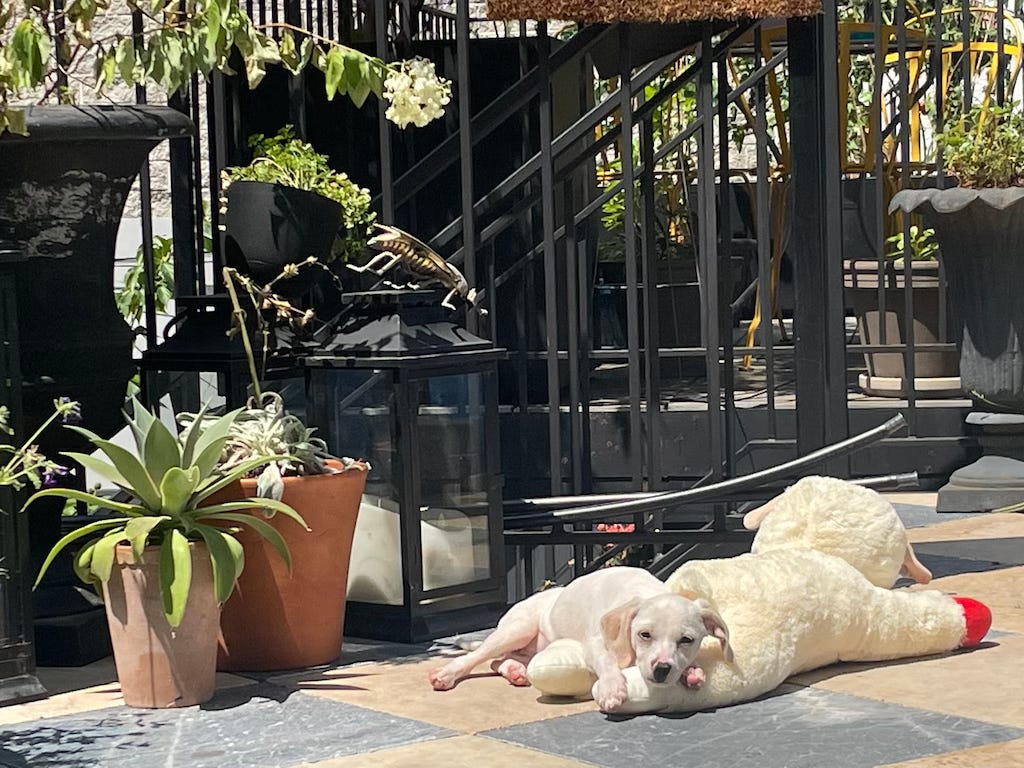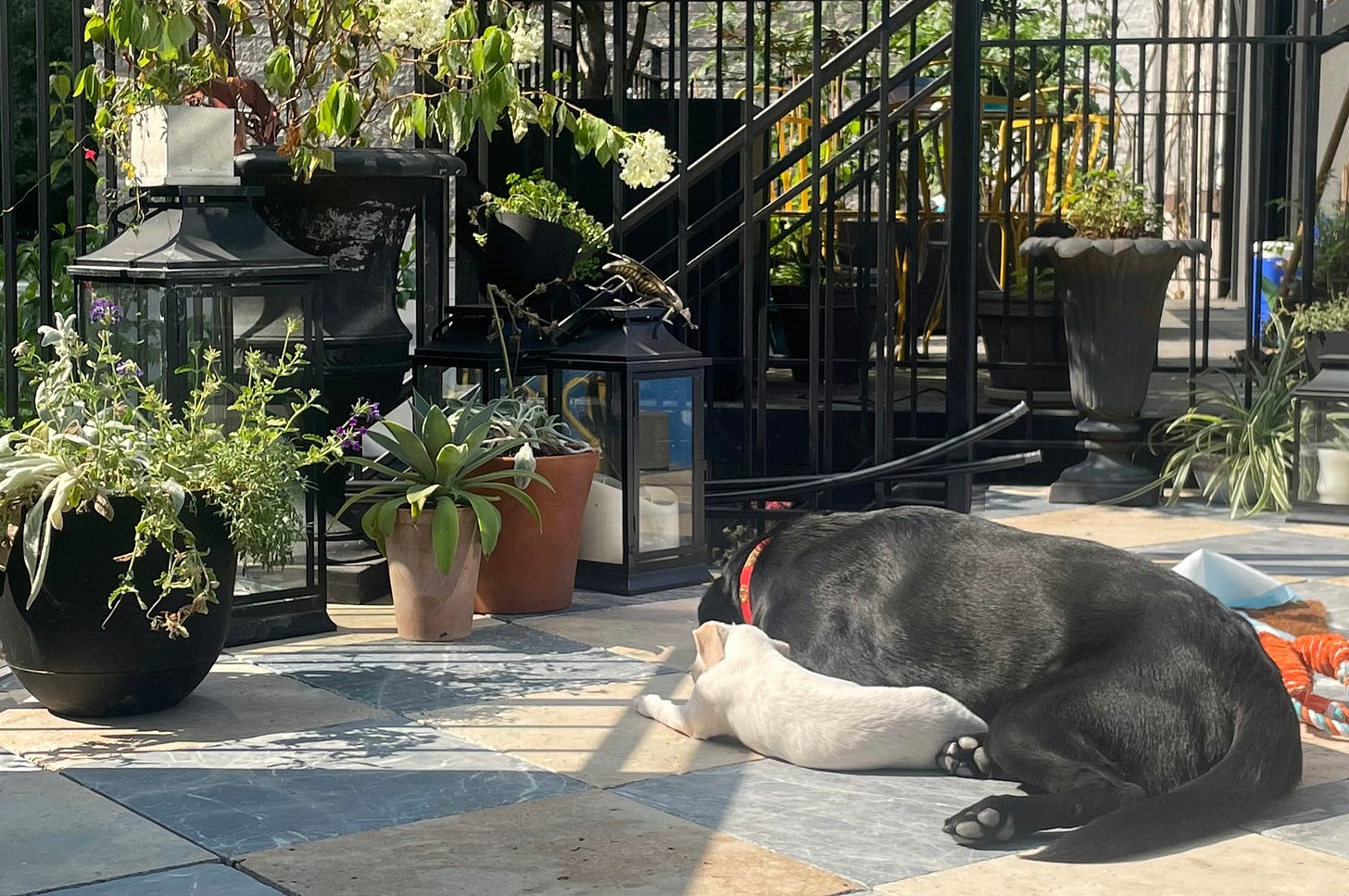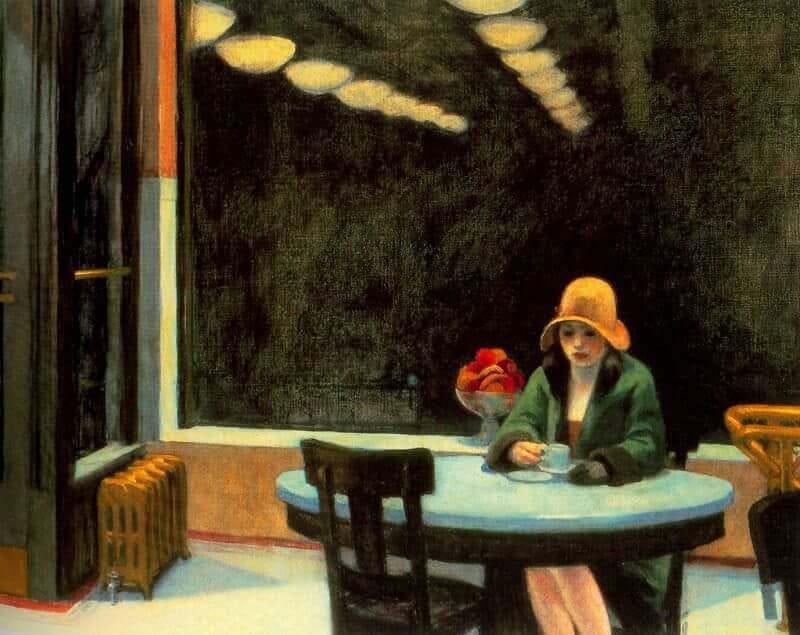Prompt 255. Oops! I Did It Again...
On fear & motherhood & a prompt by Sarah Levy on failure
Hi friend,
Oops! I did it again…
I saw a twelve-week-old puppy online in need of fostering, and on a whim, I applied and was approved. The next morning, I headed to a quiet intersection across from a park near my home to pick her up. I knew nothing about her except she was tiny and white with floppy ears and a spray of black spots on her nose, and she was coming from Texas. Eventually a truck pulled up, its side emblazoned with the company name, Lucky Tails Express, and a cartoon of a big, pup-filled stagecoach. The driver opened the back and I could hear dozens of howling dogs. Soon he emerged with a minuscule three-pound bundle, handed her over, and with that, he was gone. My new charge and I ubered home.
The day was unbearably hot and humid in Brooklyn, and as I wrote in my newsletter last week, I’d barely had the energy to get out of bed. Suddenly I was running around, tending to this overstimulated infant dog that had just made a days-long drive in the back of a transport truck. I found myself cleaning up one accident after another and saying things like, “My toe is not a chew toy!” I’m happy to report she has since calmed quite a bit, and she is adorable and perfect and loves River, and River has been the gentlest nanny to “le bébé,” as we’ve nicknamed her. But I’ve also been contemplating why—aside from my absolute love of everything canine—I felt compelled to foster this puppy. I’m freshly out of the hospital, needing a lot of rest, my husband Jon was headed out of town to play a string of shows, and oh yeah, it’s the fourth time I’ve done this in just over a year.
Then a few days in, I had an epiphany: Oh, motherhood.
In Between Two Kingdoms, I wrote about how, when I was 22, the week before I began treatment for leukemia, I learned via a late-night google search that the chemo regimen I was about to start would most likely leave me infertile. Until then, the only consideration I’d given to having a baby was how not to have one before I was ready. The next day, I asked my medical team about delaying chemo to freeze my eggs, and the subtext of their answer was, “If you do that, you’re possibly putting your life at risk.” I didn’t even know if I wanted a family of my own. But it didn’t take long before I realized it felt important to preserve that choice. It felt like hope—that I would exist in the future where I could make that choice.
So that’s what I did. I delayed chemo and found a grant to fund my egg freezing, which came with a price tag of nearly $20,000—because, in one of those absurd, infuriating catch-22s of the American healthcare system, my insurance considered it an elective procedure, as I was not yet infertile, and refused to cover it. I began taking fertility drugs, though I was still so afraid of needles that my mom had to administer the shots. A few weeks later, I had a procedure to harvest my eggs, and they went into storage. Over the next few years, as I went through cancer treatment, that’s where they stayed.
But as you might imagine, the rent in Manhattan is high even for frozen eggs, and eventually I found a long-term storage facility in Minnesota for a fraction of the cost. So off to the Midwest went my “totsicles,” as I called them. (It felt surreal as I imagined them in a little cooler in the front seat of a transport truck, all strapped in, headed down the interstate.) After that, the exorbitant monthly payment disappeared from my bank statement, replaced by a much more reasonable annual payment. For the rest of my 20s, the possibility of motherhood faded into the background.
Then around 30, as some of my friends started having babies, the thought of motherhood predictably crept back in. But I was busy writing my book, going to grad school, and training for a half-marathon. I finally felt like I was getting both my life and my health back. I was so eager to go full throttle on my writing career, and I finally had the energy and inspiration to do it.
So the question that emerged then was one many women grapple with: Can I possibly do both?—especially given that Jon was also in a creative field and traveled a lot for work. I worried that if I had a baby, it would not only hijack my newly strong body, but it would also hijack my focus and hunger for what was shaping up to be an all-consuming professional life. We talked about it a number of times, and we agreed on a timeline: When we’re ready, we’ll get married, wait a year, then revisit the subject of a baby. I even wrote an aspirational date in my journal.
Those hopeful deadlines committed to ink were totally upturned with the news that my illness was back. Now it’s an even more complicated question—what a family will look like for us. Currently I’m in a place where I feel confident in my career, and I believe in our ability to figure out the balance, but different fears loom. One is what happens if I’m not well enough to care for the baby. Another more subterranean fear that courses below that: the fear of having a baby only to orphan it.
It’s something I can’t say out loud—because whomever I say it to will inevitably reply, “No, no, no, that won’t happen.” I don’t fault them; it’s human instinct. But from my early 20s and that difficult decision to delay chemo for the egg freezing, motherhood has been intrinsically linked to my mortality; and given the threat of another relapse, my mortality is never far from my mind. It’s isolating to have such a looming fear that can’t be stated out loud. I don’t want to silence this fear or even conquer it, but rather to make some kind of peace with it. To accept it as a possibility and move forward with it—even if that conversation can only happen in the privacy of my journal.
In the meantime, I’m finding a sense of competence and confidence in my ability to care for this puppy. It’s not only been fun but invigorating. Puppy raising is its own kind of physical therapy. It makes me think, “Maybe I can do this. Maybe with a baby dog right now, and maybe a baby human someday.” One of the many arguments I’ve presented to Jon as to why le bébé should be a foster fail—to join our family permanently—is that she’s preparing me for motherhood. (I know, I know! Excellent chess move, Susu!) Adding to my case was the guy who showed up the other day to deep clean our couch. While he was here, le bébé had another tour de fecal, and he gave me a few tips for clean-up. I said it was shocking what can come out of her body given how little she is. “Trust me, I know,” he said. “I have six children.”
I certainly haven’t gotten to the other side of the motherhood fear, but I’m probing it in a new way. And today I have an essay and prompt to share with you from the memoirist Sarah Levy that might help you identify and parse some of your own unique fears. It’s called “Whenever I Feel Afraid,” and it’s a new favorite. Read on to see why.
Sending love,
Suleika
Some Items of Note—
In case you missed it, we posted this month’s Notes from the Hatch: On Varieties of Friends. Inspired by the poet Mary Ruefle and her essay “Dear Friends,” it was at turns nostalgic, hopeful, meditative, and joyous. Find the recap here!
To join this week’s chorus of collective gratitude—one of the most uplifting, re-humanizing experiences ever—you can follow and add your small joy here!
For more epic foster tales, you can read about Franny, the Arubian stray; Maude, the singing chihuahua; and Lionel, the yellow lab who belongs in a country song.
Prompt 255. Whenever I Feel Afraid by Sarah Levy
I have always been afraid to fail. At a school choir performance when I was six, I stood up on a piano bench and launched into a solo rendition of “I Whistle a Happy Tune,” from the 1951 Rodgers and Hammerstein musical, The King and I. All eyes were on me, and I was nervous. In a home video, my voice shakes as I start to sing, but the lyrics carry me forward.
Whenever I feel afraid / I hold my head erect / And whistle a happy tune / so no one will suspect / I'm afraid
Two decades later, I had perfected the art of faking it. I was in my early 20s and frequently found myself waking up on sticky couches, dazed and hungover in the aftermath of blackouts. No one suspected I had a problem with alcohol; I was young, accomplished, and partied socially, never alone or first thing in the morning. Despite my external facade, a voice deep within had started whispering the same refrain: You need to stop drinking.
I tried and failed to quit. A two-week stint at 23, a dry month at 25. These starts and stops were frustrating, but essential for ultimately surrendering to sobriety at 28.
In my early months of recovery, I grieved my old life and the party girl persona that allowed me to mask insecurities. At the same time, I started to cherish the seeds of sobriety I was planting. At three months sober, when I ordered a virgin Bloody Mary at brunch in New York City, the waitress accidentally served me the alcoholic variety. I felt the vodka burn as I took my first sip, but it was too late to spit it out. Out on the sidewalk, January wind whipping across my cheeks, I called my dad in tears. Did I have to start over? My dad reassured me that the sip didn’t count as a slip. I hadn’t intended to drink, therefore my sobriety was intact. His response was comforting; I couldn’t bear the thought of failing at this again.
I started writing about my road to recovery, and a few years later, my memoir, Drinking Games, was published. In going public with my sobriety, I discovered a beautiful community of people who related to my struggles. I no longer worried about drinking; I didn’t miss the way alcohol left me feeling shriveled like a prune. Instead, I feared that my sobriety would get stale as the sheen of early recovery started to wear off. I worried about setting a good example or failing my readers.
My instinct was to fake my way through and whistle a happy tune so no one would suspect I was afraid. But over time, I began to reframe my fears of failure as powerful pieces of information. We are afraid to fail at the things we care about. My fears of failure are a beautiful reminder of everything recovery has given me—everything I fought so hard to gain and don’t want to lose.
Your prompt for the week:
Write about your most looming fear of failure—where it shows up and when. Now call to mind the people, experiences, and things in your life that you care about. How does your fear of failure overlap with what matters to you most?
If you’d like, you can post your response in the comments section, in our Facebook group, or on Instagram by tagging @theisolationjournals.
Today’s Contributor—
Sarah Levy is a writer and the author of Drinking Games, a memoir in essays that explores the role alcohol has in our formative years and what it means to opt out of a culture completely enmeshed in drinking. Her work explores sobriety, relationships, culture, and identity and has been published by The New York Times, The Cut, A Cup of Jo, Vogue, and TIME, among other publications. For weekly essays, interviews, and reflections on life through a sober lens, check out her newsletter, Seltzer Rocks.
For more paid subscriber benefits see—
A Creative Heart-to-Heart, a raw, unfiltered conversation with my beloved husband Jon Batiste about life, the creative process, and how we can marry our sorrows and our joys
On Creating Beyond Fear, an interview with the brilliant author Elizabeth Gilbert, where we talked about curiosity and she shared her anti-purpose talk, then gave us a tour of her church-turned-creative-sanctuary
Goodbye to All That, an installment of my advice column Dear Susu, where I answer the question from a disillusioned city mouse who is longing for country life but doesn’t know where to go













I felt so emotionally connected to your post about motherhood I wanted to write. I’m the other side of this for you - when I was diagnosed with an aggressive breast cancer I already had a 13 year old and a 6 year old. Every day I think about whether they will be left without a mother. But every day I also look at them as amazing people in the world in their own right. Who know for whatever time they’ve had a mum who adores them. My cancer was oestrogen fed and I’ve wondered to my partner was that the same hormones that let me have an easy natural pregnancy at 43. Would I have missed my girl being in the world for not being hormonal - not for a second. I’d take the cancer in a flash. I wish you all the best with your thinking and maybe decisions. Kids or no kids though your love for people and animals and the creative spirit shines through - you saved my sanity and I’m sure for so many others. And that’s also a kind of mothering.
My heart resonates deeply with this post, having been unable to have children due to an autoimmune illness that cast a shadow over my 30s and early 40s. Fear of failure was a strong theme through that whole chapter. In some ways I felt like I failed to graduate from the University of Womanhood, though these days I'm much more at peace with the reality that life had a different path for me. Wishing you well on your journey as you figure out your own path and whether motherhood is part of it. What I will say is there are many ways to embody and express the mothering energy (puppy love being one 😊❤️)